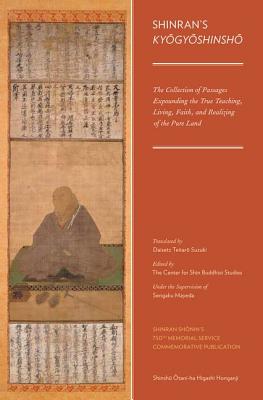

 Oxford University Press, USA
Oxford University Press, USA
Shinran's Kyogyoshinsho: The Collection of Passages Expounding the True Teaching, Living, Faith, and Realizing of the Pure Land


Key Metrics
- Daisetz Teitaro Suzuki
- Oxford University Press, USA
- Hardcover
- 9780199863105
- 9.3 X 6.3 X 1 inches
- 1.55 pounds
- Religion > Buddhism - Sacred Writings
- English
 Secure Transaction
Secure TransactionBook Description
Writing in Classical Chinese, Shinran began this, his magnum opus, while in exile and spent the better part of thirty years after his return to Kyoto revising the text. Although unfinished, Suzuki's translation conveys the text's core religious message, showing how Shinran offered a new understanding of faith as the conclusion of studying teachings and engaging in praxis, rather than the more traditional view of faith in Buddhism as relevant to one just beginning their pursuit of Buddhist truth.
Although Suzuki is best known for his scholarship on Zen Buddhism, he took a lifelong interest in Pure Land Buddhism. Suzuki's own religious perspective is evident in his translation of gyo as True Living rather than the expected Practice, and of sho as True Realizing of the Pure Land rather than the expected Enlightenment or Confirmation. This book contains the second edition of Suzuki's translation. It includes a number of corrections to the original 1973 edition, long out of print. It also contains for the first time Suzuki's own introduction, previously thought to be unfinished, which has been carefully and appropriately re-edited to reflect the assumed complete form.
Author Bio
Daisetz Teitaro Suzuki (1870-1966) was a Japanese translator, teacher, and constructive interpreter of Zen Buddhist thought to the West.
Choosing belief over doubt has profound, eternal consequences for practicing Christians, while for religious Jews and Moslems alike, faith in God is the cornerstone of righteousness. Yet elsewhere in the world, revered spiritual traditions exist in which the struggle between belief and unbelief is of little importance. Daisetz Teitaro Suzuki is an eloquent international spokesman for one of these traditions: the Japanese variant of Buddhism known as Zen.
A widely traveled Japanese scholar, Suzuki taught in that country's university system, translated several Eastern philosophical works into English, and corresponded widely with Christian contemplatives such as Thomas Merton. Through his books and lectures, Suzuki became Zen's leading voice in America during the mid-20th century. His Introduction to Zen Buddhism, published in 1956, not only offers an overview of the historical background of Zen philosophy and practice, but succeeds in conveying something of its seemingly inexpressible essence.
Source: Pbs.org and Encyclopedia.com
Videos
No Videos
Community reviews
Write a ReviewNo Community reviews